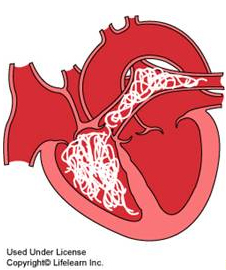
Heartworm season is approaching with the season in Ontario beginning in June and lasting until November. Get to know what heartworm is and what you can do to protect your pets.
Heartworm in dogs is caused by mosquitoes that carry infective larvae. The infected heartworm larvae migrate from bite wounds from the mosquito through the dog’s body until it reaches the heart and blood vessels of the lungs where they mature. Adult heartworms then reproduce and release immature heartworm, known as microfilariae, into the blood. When a mosquito bites an infected dog, it takes in these microfilariae with the blood and passes on the infective heartworm larvae to the next dog, continuing the cycle and spreading the disease to the next host. The definitive host for heartworm disease is the dog, but it can also affect cats, foxes, coyotes, wolves and other animals too. The period between the initial infection when the dog is bitten, to the maturation of worms into adults in the heart takes 6-7 months to complete. Adult heartworms can reach to a size of 12 inches long.
Dogs show no evidence of heartworm infection during the 6 month process. Many dogs may show little to no signs even after worms mature, especially if they have a light infection or sedentary lifestyle. Dogs with a case of heartworm disease may start out with mild symptoms such as coughing and early exhaustion upon exercise, but later develop full blown cardiomyopathy with swelling in the limbs, fluid buildup in the lungs, and reluctance to move because the dog quickly becomes exhausted. When dogs are severely infected, signs may include severe weight loss, fainting and coughing up blood.
Preventive drugs are highly effective when regularly administered. Most compromises in the protection come from failure to properly administer the medication, typically during seasonal changes. In regions where temperatures are above 14°C year-round, a continuous heartworm preventive schedule is recommended. Heartworm preventive medication can only be used if adult heartworms are not present; using preventive medication on adult heartworms can have serious and potential fatal consequences and different protocols are needed to be followed for infected dogs. Before heartworm preventive medication can be dispensed, a heartworm test is provided by a veterinarian by collecting a small blood sample which is used to detect the presence of heartworm proteins.
At Avro Pet Hospital, our veterinarian can advise you on the best monthly heartworm preventive medication needed for your lifestyle. Call us today to book your heartworm test and protect your pet against heartworm.




